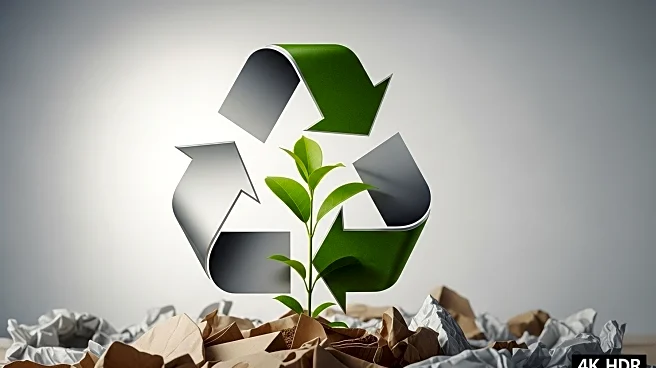What is the story about?
What's Happening?
Retailers are increasingly adopting smart sustainability practices to address the growing issue of waste and improve business efficiency. With over $288 billion worth of unsold inventory being landfilled, burned, or buried annually, companies are turning to innovative solutions such as upcycling and downcycling to repurpose materials. New technologies are enabling businesses to transform end-of-life feedstocks into valuable materials for manufacturers, contributing to a circular economy. E-commerce businesses are also acquiring older collections from retailers to resell at lower prices, reducing waste and offering consumers affordable options. Additionally, data-driven inventory software is helping retailers optimize their supply chains by providing accurate estimates of production needs, thereby minimizing excess inventory.
Why It's Important?
The shift towards smart sustainability is crucial for both environmental and economic reasons. By reducing waste, retailers can lower costs and improve their bottom line while also meeting consumer demands for more sustainable practices. This approach not only helps companies achieve their Environmental, Social, and Governance (ESG) goals but also enhances their brand reputation among increasingly eco-conscious consumers. Furthermore, the adoption of efficient inventory management systems can lead to significant cost savings and operational improvements. As sustainability becomes a key factor in consumer purchasing decisions, businesses that prioritize these practices are likely to gain a competitive edge in the market.
What's Next?
Retailers are expected to continue exploring innovative solutions to further reduce waste and improve sustainability. The integration of technology in supply chain management will likely expand, with more companies adopting data-driven tools to optimize inventory and reduce excess. Additionally, the concept of peer-to-peer returns and automated rerouting of customer returns to local nonprofits may gain traction, offering cost-effective alternatives to traditional reverse logistics. As these practices become more widespread, retailers will need to adapt to changing consumer expectations and regulatory pressures related to sustainability.
Beyond the Headlines
The move towards smart sustainability in retail also raises ethical considerations regarding the responsibility of businesses to minimize their environmental impact. As companies increasingly focus on ESG goals, there may be a shift in corporate culture towards greater transparency and accountability in sustainability practices. This could lead to long-term changes in industry standards and consumer behavior, with sustainability becoming a central aspect of business strategy.
















